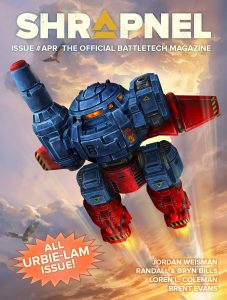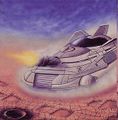Difference between revisions of "Saladin"
m |
m (→Variants) |
||
| Line 28: | Line 28: | ||
* LB-X - This variant of the Saladin replaces the AC/20 with a [[LB 20-X AC]]. Crews usually carry a ton of cluster rounds and two tons of solid slug rounds. BV (2.0) = 760<ref>''Record Sheets: 3058 Unabridged (Inner Sphere)'', p. 76</ref> | * LB-X - This variant of the Saladin replaces the AC/20 with a [[LB 20-X AC]]. Crews usually carry a ton of cluster rounds and two tons of solid slug rounds. BV (2.0) = 760<ref>''Record Sheets: 3058 Unabridged (Inner Sphere)'', p. 76</ref> | ||
| − | * Ultra - Another simple upgrade, this version uses an [[Ultra AC/20]] as its main weapon. BV (2.0) = 760<ref>''Record Sheets: 3058 Unabridged (Inner Sphere)'', p. 77</ref> | + | * Ultra - Another simple upgrade, this version uses an [[Ultra AC/20]] as its main weapon instead of the LB 20-X. BV (2.0) = 760<ref>''Record Sheets: 3058 Unabridged (Inner Sphere)'', p. 77</ref> |
| − | * Clan Cargo - During the [[Clan Invasion]] several Saladins were captured by the attacking Clans. The Clans saw no use for them in their military, so the Technician Caste removed the autocannons and replaced them with a large (17 ton) cargo bay and more armor protection. The Clans used these vehicles to transport troops, parts, and ammunition to the front lines without worrying about being injured. BV (2.0) = 150<ref>''Record Sheets: 3058 Unabridged (Inner Sphere)'', p. 75</ref> | + | * Clan Cargo - During the [[Clan Invasion]], several Saladins were captured by the attacking Clans. The Clans saw no use for them in their military, so the Technician Caste removed the autocannons and replaced them with a large (17 ton) cargo bay and more armor protection. The Clans used these vehicles to transport troops, parts, and ammunition to the front lines without worrying about being injured. BV (2.0) = 150<ref>''Record Sheets: 3058 Unabridged (Inner Sphere)'', p. 75</ref> |
| − | * Saladin Ifrit - This custom refit uses a fusion engine to provide a top speed of 140km/h. It also uses [[Experimental Technology|experimental]] [[Vehicle Jump Jet]]s to provide a jump capability of 270 meters. This required the removal of the LB 20-X autocannon normally used; Instead the | + | * Saladin Ifrit - This custom refit uses a fusion engine to provide a top speed of 140km/h. It also uses [[Experimental Technology|experimental]] [[Vehicle Jump Jet]]s to provide a jump capability of 270 meters. This required the removal of the LB 20-X autocannon normally used; Instead the Saladin Ifrit uses a [[Snub Nose PPC]] paired with a [[Targeting Computer]] to inflict damage. Though the maximum damage inflicted per engagement has dropped, the increased speed, maneuverability and battlefield endurance has more than compensated. BV (2.0) = 955<ref>''Experimental Technical Readout: Periphery'', p. 7</ref> |
==Vehicle Gallery== | ==Vehicle Gallery== | ||
Revision as of 16:33, 17 January 2012
| 191px | |
| Saladin Assault Hover Tank | |
| Production information | |
| Manufacturer | Scarborough Limited |
| Mission | Raid/Defense |
| Type | Hover |
| Cost | 911,625 C-bills |
| Technical specifications | |
| Mass | 35 tons |
| Armor | ProtecTech 4 Standard |
| Engine | 105 ConLee 105 I.C.E |
| Speed | 129.6 km/h |
| Crew | 3 |
| Armament |
|
| BV (1.0) | 483 |
| BV (2.0) | 596 |
Description
Built by the same company that made the Saracen and Scimitar, the Saladin was Scarborough's last medium hover tank. It is unlike its brothers in that the Saladin does not mount a turret, and its only weapon is a heavy, short-range AC/20. Since it's vastly different from the company's other hovercraft, buyers were quite skeptical about purchasing it; Scarborough had to offer incentives like free training and transportation. Soon it became as cheap as the Saracen and spread throughout the whole Inner Sphere.
Armament
With a top speed of 130 kph and sporting a Scarborough Original 20 Autocannon/20 it is by far the fastest land vehicle to mount such a devastating weapon. Unlike other vehicle that have a turret, the tactics for using the Saladin are different. They're best used to make passing runs like AeroSpace Fighters: rush toward the enemy, close in and fire, then continue past and turn back for another run. Therefore the armor layout is different - the majority of the Saladin's armor is located at the front, while the vehicle's sides and rear are left comparatively vulnerable.
Variants
- LB-X - This variant of the Saladin replaces the AC/20 with a LB 20-X AC. Crews usually carry a ton of cluster rounds and two tons of solid slug rounds. BV (2.0) = 760[1]
- Ultra - Another simple upgrade, this version uses an Ultra AC/20 as its main weapon instead of the LB 20-X. BV (2.0) = 760[2]
- Clan Cargo - During the Clan Invasion, several Saladins were captured by the attacking Clans. The Clans saw no use for them in their military, so the Technician Caste removed the autocannons and replaced them with a large (17 ton) cargo bay and more armor protection. The Clans used these vehicles to transport troops, parts, and ammunition to the front lines without worrying about being injured. BV (2.0) = 150[3]
- Saladin Ifrit - This custom refit uses a fusion engine to provide a top speed of 140km/h. It also uses experimental Vehicle Jump Jets to provide a jump capability of 270 meters. This required the removal of the LB 20-X autocannon normally used; Instead the Saladin Ifrit uses a Snub Nose PPC paired with a Targeting Computer to inflict damage. Though the maximum damage inflicted per engagement has dropped, the increased speed, maneuverability and battlefield endurance has more than compensated. BV (2.0) = 955[4]



